2018—2019学年上学期武汉二中期末考试高一英语试卷附答案
2018—2019高一英语期末考试试题(含答案)
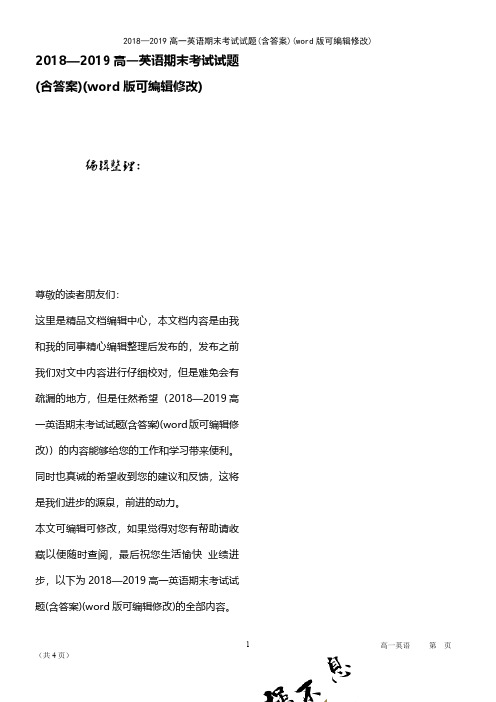
2018—2019高一英语期末考试试题(含答案)(word 版可编辑修改)高一英语 第 页(共4页)12018—2019高一英语期末考试试题(含答案)(word 版可编辑修改)编辑整理:尊敬的读者朋友们:这里是精品文档编辑中心,本文档内容是由我和我的同事精心编辑整理后发布的,发布之前我们对文中内容进行仔细校对,但是难免会有疏漏的地方,但是任然希望(2018—2019高一英语期末考试试题(含答案)(word 版可编辑修改))的内容能够给您的工作和学习带来便利。
同时也真诚的希望收到您的建议和反馈,这将是我们进步的源泉,前进的动力。
本文可编辑可修改,如果觉得对您有帮助请收藏以便随时查阅,最后祝您生活愉快 业绩进步,以下为2018—2019高一英语期末考试试题(含答案)(word 版可编辑修改)的全部内容。
B。
who play games on the sports groundC。
living in the same neighborhoodD。
doing things together under a leader and with a common purpose22. Karaoke is just a ______。
A。
cassette tape with only music B. cassette tape recorderC。
band from Japan D。
voice recording equipment23. People went to public houses and snack bars ______when Karaoke appeared.A。
to buy the equipment B。
to have something to drinkC. to get something to eatD. to have a good timeBAfter a serious earthquake happened, a father left his wife safely at home and rushed to his son's school, only to find that the building where his son studied had collapsed(倒塌)and looked like a pancake。
湖北省武汉市第二中学2018-2019学年高一上学期期末考试英语试题 Word版含答案

2018-2019学年上学期武汉二中期末考试高一英语试卷试卷满分:150分第一部分:听力(共两节,满分30分)做题时,先将答案划在试卷上。
录音内容结束后,你将有两分钟的时间将试卷上的答案转涂到答题卡上。
第一节(共5小题;每小题1.5分,满分7.5分)听下面5段对话。
每段对话后有一个小题,从题中所给的A、B、C三个选项中选出最佳选项,并标在试卷的相应位置。
听完每段对话后,你都有10秒钟的时间来回答有关小题和阅读下一小题。
每段对话仅读一遍。
1.What will the man buy for the woman?A. Notebooks.B. Paper.C. Pencils.2.Where does the conversation take place?A. In a bookstore .B. In a library.C. In the woman’soffice.3.Why will Mr. Rogers be out of the office next week?A. To take a holiday.B. To attend a wedding.C. To travel onbusiness.4.What does the man mean?A. The woman can’t leave early.B. He will pick up the woman’s parents.C. Mr. Black won’t come at 4 o’clock.5. What are the speakers talking about?A. A lift worker.B. The man’s sis ter.C. A liftaccident.第二节(共15小题;每小题1.5分,满分22.5分)听下面5段对话或独白。
每段对话或独白后有几个小题,从题中所给的A、B、C三个选项中选出最佳选项。
2018—2019高一英语期末考试试题(含答案)
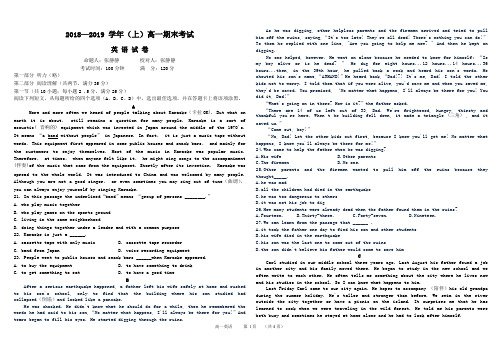
英语试卷
To them he replied with one line, "Are you going to help me now? " And then he kept on digging.
命题人:张静静 考试时间:100 分钟 第一部分 听力(略) 第二部分 阅读理解(共两节,满分 35 分)
D.the son didn't believe his father would come to save him C
Carl studied in our middle school three years ago. Last August his father found a job in another city and his family moved there. He began to study in the new school and we often write to each other. He often tells me something about the city where he lives now and his studies in the school. So I can know what happens to him.
they'd be saved. You promised, ‘No matter what happens, I'll always be there for you! You did it, Dad!” “What's going on in there? How is it?”the father asked. “There are 14 of us left out of 33, Dad. We're frightened, hungry, thirsty and thankful you're here. When t he building fell down, it made a triangle (三角) , and it
2018~2019学年高一英语期末试卷及答案
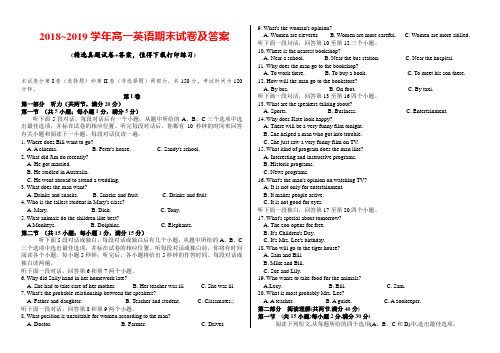
2018~2019学年高一英语期末试卷及答案(精选真题试卷+答案,值得下载打印练习)本试卷分第I卷(选择题)和第II卷(非选择题)两部分。
共150分,考试时间为120分钟。
第I卷第一部分听力(共两节,满分20分)第一节(共5小题;每小题1分,满分5分)听下面5段对话。
每段对话后有一个小题,从题中所给的A、B、C三个选项中选出最佳选项,并标在试卷的相应位置。
听完每段对话后,你都有10秒钟的时间来回答有关小题和阅读下一小题。
每段对话仅读一遍。
1. Where does Bill want to go?A. A cinema.B. Peter's house.C. Sandy's school.2. What did Jim do recently?A. He got married.B. He studied in Australia.C. He went abroad to attend a wedding.3. What does the man want?A. Drinks and snacks.B. Snacks and fruit.C. Drinks and fruit.4. Who is the tallest student in Mary's class?A. Mary.B. Dick.C. Tony.5. What animals do the children like best?A.Monkeys.B. Dolphins.C. Elephants.第二节(共15小题;每小题1分,满分15分)听下面5段对话或独白。
每段对话或独白后有几个小题,从题中所给的A、B、C 三个选项中选出最佳选项,井标在试卷的相应位置。
听每段对话或独白前,你将有时间阅读各个小题,每小题5秒钟;听完后,各小题将给出5秒钟的作答时间。
每段对话或独白读两遍。
听下面一段对话,回答第6和第7两个小题。
2018-2019(含答案)高一(上)期末英语试卷 (2)

第1页 共18页 ◎ 第2页 共18页2018-2019(含答案)高一(上)期末英语试卷 (2)第一部分听力(共两节,满分7.5分)该部分分为第一、第二两节。
注意:回答听力部分时,请先将答案标在试卷上。
听力部分结束前,你将有两分钟的时间将你的答案转涂到客观题答题卡上。
第一节(共5小题;每小题1.5分,满分7.5分)一、听下面5段对话。
每段对话后有一个小题,从题中所给的A 、B 、C 三个选项中选出最佳选项,并标在试卷的相应位置。
听完每段对话后,你都有10秒钟的时间来回答有关小题和阅读下一小题。
每段对话仅读一遍。
1. When did the woman come ? A .At about 2:20. B .At about 3:20. C .At about 5:20.2. What size shoes does the man probably need ? A .Size 6. B .Size 7. C .Size 8.3. Why hasn’t the woman seen the man recently ? A .Because he has been ill in bed .B .Because they are not in the same city at the moment .C .Because he has two different jobs .4. What is the most probable relationship between the two speakers ? A.Teacher and st udent . B.Mother and so n . C.Sister and brot her .5. What does the young man want ? A .Some books on English literature . B .Some American newspapers .C .Some books on American literature .第二节(共5小题;每小题1.5分,满分22.5分)听下面5段对话或独白。
2018-2019高一英语上学期期末试卷附标准答案

2018-2019高一英语上学期期末试卷附标准答案全卷满分120分考试时间90分钟第I卷(满分70分)第一部分阅读理解(共三节,满分40分)第一节(共10小题;每题1分,满分10分)从每题所给的A、B、C和D四个选项中,选出最佳选项1. In the dark forests , some large enough to hold several English towns.A. stands many lakesB. lie many lakesC. many lakes lieD. many lakes stand2. I am very worried because my son most of his spare time playing games on the computer.A. concentrates; onB. concentrates; inC. focuses; toD. focuses; in3. Our class is 60 students while theirs 65 students.A. consisted of; made up ofB. made up of; consists ofC. made up; compose ofD. composed of; makes up4. They went to the zoo on foot by bus.A. insteadB. instead ofC. withoutD. but5. That hall is this one. Let’s go to one.A. three times the size of; a bigB. three times as big as; the biggerC. three times bigger than; a biggerD. three times as bigger as; the bigger6. Whether the drinking water is clean is connected human health.A. toB. byC. withD. into7. The school had to expand to take more students.A. inB. offC. onD. away8. I feel necessary to finish the task on time.A. oneB. thisC. thatD. it9. of the water used up.A. Three fifth; isB. Three fifth; areC. Three fifths; isD. Three fifths; are10. ---How do you like the museum?---- It was than I expected.A. far more interestingB. very much interestingC. so more interestingD. quite much interesting第二节(共10小题;每题2分,满分20分)阅读下列短文;从每题所给的A、B、C和D四个选项中,选出最佳选项。
2018-2019高一英语上学期期末试卷+答案
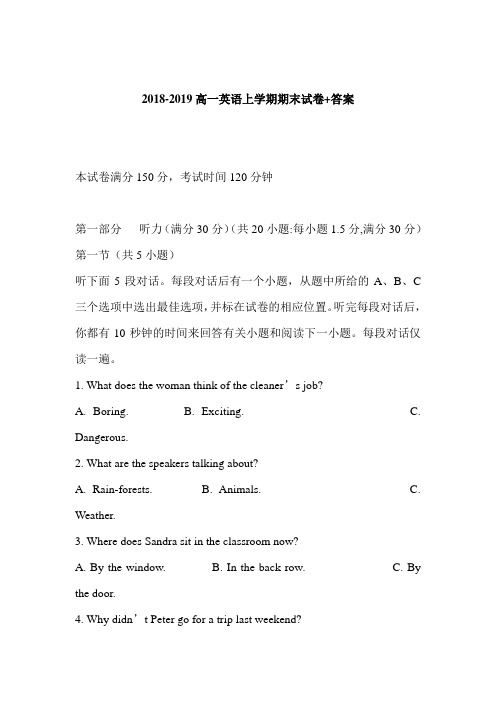
2018-2019高一英语上学期期末试卷+答案本试卷满分150分,考试时间120分钟第一部分听力(满分30分)(共20小题:每小题1.5分,满分30分)第一节(共5小题)听下面5段对话。
每段对话后有一个小题,从题中所给的A、B、C 三个选项中选出最佳选项,并标在试卷的相应位置。
听完每段对话后,你都有10秒钟的时间来回答有关小题和阅读下一小题。
每段对话仅读一遍。
1. What does the woman think of the cleaner’s job?A. Boring.B. Exciting.C. Dangerous.2. What are the speakers talking about?A. Rain-forests.B. Animals.C. Weather.3. Where does Sandra sit in the classroom now?A. By the window.B. In the back row.C. By the door.4. Why didn’t Peter go for a trip last weekend?A. He missed the train.B. He didn’t buy the ticket.C. He didn’t get to the station.5. What’s the man’s idea about the skirt?A. Change it.B. Buy it.C. Reject it.第二节(共15小题)听下面5段对话或独白。
每段对话或独白后有几个小题, 从题中所给的A、B、C三个选项中选出最佳选项, 并标在试卷的相应位置。
听每段对话或独白前, 你将有时间阅读各个小题, 每小题5秒钟;听完后, 各小题将给出5秒钟的作答时间。
每段对话或独白读两遍。
听第6段材料,回答第6和第7题。
6. What has the man been doing?A. Working in the lab.B. Writing a report.C. Collecting some information.7. What is the man going to write about?A. The environment.B. VR technology.C. The government.听第7段材料,回答第8和第9题。
湖北省武汉二中高一上学期期末考试(英语).doc
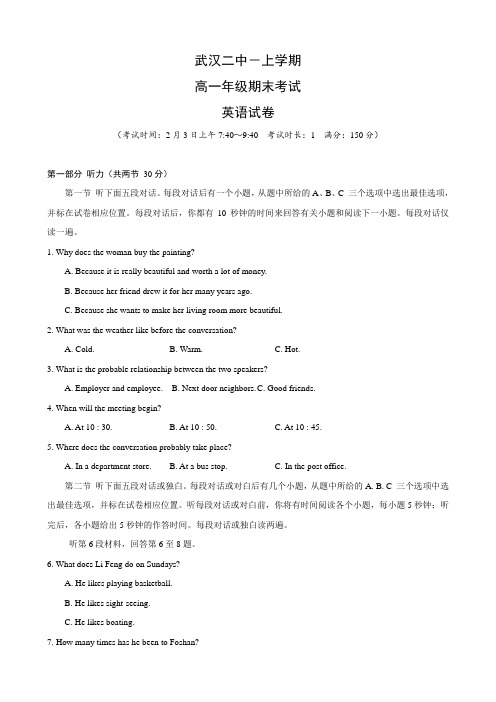
武汉二中-上学期高一年级期末考试英语试卷(考试时间:2月3日上午7:40~9:40 考试时长:1满分:150分)第一部分听力(共两节30分)第一节听下面五段对话。
每段对话后有一个小题,从题中所给的A、B、C 三个选项中选出最佳选项,并标在试卷相应位置。
每段对话后,你都有10秒钟的时间来回答有关小题和阅读下一小题。
每段对话仅读一遍。
1. Why does the woman buy the painting?A. Because it is really beautiful and worth a lot of money.B. Because her friend drew it for her many years ago.C. Because she wants to make her living room more beautiful.2. What was the weather like before the conversation?A. Cold.B. Warm.C. Hot.3. What is the probable relationship between the two speakers?A. Employer and employee.B. Next door neighbors.C. Good friends.4. When will the meeting begin?A. At 10 : 30.B. At 10 : 50.C. At 10 : 45.5. Where does the conversation probably take place?A. In a department store.B. At a bus stop.C. In the post office.第二节听下面五段对话或独白。
每段对话或对白后有几个小题,从题中所给的A. B. C 三个选项中选出最佳选项,并标在试卷相应位置。
- 1、下载文档前请自行甄别文档内容的完整性,平台不提供额外的编辑、内容补充、找答案等附加服务。
- 2、"仅部分预览"的文档,不可在线预览部分如存在完整性等问题,可反馈申请退款(可完整预览的文档不适用该条件!)。
- 3、如文档侵犯您的权益,请联系客服反馈,我们会尽快为您处理(人工客服工作时间:9:00-18:30)。
2018—2019 学年上学期武汉二中期末考试高一英语试卷试卷满分: 150分第一部分:听力(共两节,满分30分)做题时,先将答案划在试卷上。
录音内容结束后,你将有两分钟的时间将试卷上的答案转涂到答题卡上。
第一节(共5小题;每小题 1.5分,满分7.5分)听下面5段对话。
每段对话后有一个小题,从题中所给的A、B、C三个选项中选出最佳选项,并标在试卷的相应位置。
听完每段对话后,你都有10秒钟的时间来回答有关小题和阅读下一小题。
每段对话仅读一遍。
1.What will the man buy for the woman?A. Notebooks.B. Paper.C. Pencils.2.Where does the conversation take place?A. In a bookstore .B. In a library.C. In thewoman’s office.3.Why will Mr. Rogers be out of the office next week?A. To take a holiday.B. To attend a wedding.C. To travel onbusiness.4.What does the man mean?A. The woman can’t leave early.B. He will pick up the woman’s parents.C. Mr. Black won’t come at 4 o’clock.5. What are the speakers talking about?A. A lift worker.B. The man’s sister.C. A liftaccident.第二节(共15小题;每小题 1.5分,满分22.5分)听下面5段对话或独白。
每段对话或独白后有几个小题,从题中所给的A、B、C三个选项中选出最佳选项。
听每段对话或独白前,你将有时间阅读各个小题,每小题5秒钟;听完后,各小题给出5秒钟的作答时间。
每段对话或独白读两遍。
听第6段材料,回答第6、7题。
6. Why did Gareth Jones quit the game halfway?A. He got hurt.B. He was too tired.C.He broke match rules.7. What will the speakers do next Saturday?A. Visit Gareth.B. Watch a game.C.Play a match.听第7段材料,回答第8、9题8. What impressed the man most?A. The plot.B. The main performers.C.The songs.9. What do we know about the musical?A. The man has seen it.B. The writer won awards for it.C. People speak highly of its plot.听第8段材料,回答第10至12题。
10. What did the woman think of the house owner?A. Kind.B. Cold.C. Serious.11. Why did the woman leave the flat?A. Because the rent was high.B. Because the room was too cold.C. Because the neighbors were noisy.12. How did the wom an’s neighbor act when they met one morning?A. Angrily.B. Sadly.C.Dishonestly.听第9段材料,回答第13至16题。
13. How high does the woman need to climb for walking?A. 1,500 meters.B. 2,000 meters.C. 4,000meters.14. How did the woman prepare for the walking?A. She slept out in the tent in winter.B. She climbed a 4,000-meter high mountain.C. She took long walks through the hills daily.15. What did the woman think of the walking?A. It was hard but enjoyable.B. It was difficult and tiresome.C. It was wonderful and smooth.16. What was the most exciting moment during the walking?A. Watching the sunset.B. Seeing the ruined building.C. Walking through the Sun Gate.听第10段材料,回答第17至20题。
17. How long does the break in Barcelona last?A. Two nights.B. Three nights.C. Seven nights.18. What costs extra money for the Barcelona break?A. Flights.B. Breakfast.C. Evening meals.19. On what can visitors get discounts with a discount card?A. All the city sights.B. Some restaurants.C. 5-star hotels.20. When is the deadline of the booking for the Barcelona break?A. September 30th.B. October 5th.C. October 31st. 第二部分阅读理解(共两节,满分40分)第一节(共15小题,每小题2分,满分30分)阅读下列短文,从每题所给的四个选项(A、B、C和D)中,选出最佳选项并在答题卡上将给选项涂黑。
AYour Nose KnowsIf I were to ask you to shut your eyes and I gave you a piece of apple to eat, wouldyou be able to tell me what it is just by tasting it? Of course, you could. Your tongueis covered with tiny “taste buds” which help you know what different foods taste like.Do you know that foods would taste different if you did not have a nose?This experiment shows how important your nose is when you taste things.What You Need:a friend to helpsmall pieces of any food like carrot, orange, banana -whatever you have handysmall pieces of apple, raw potato, and (if you are brave) onionWhat You Do:There are actually three different experiments, You and your friend should take turns trying them on each other.Experiment 1:Have your friend close her eyes and open her mouth. Give her a piece of the food andask her to taste it. Then, ask her what she thinks it is. She will probably guess correctly. Experiment 2:While your friend has her eyes closed, give her a piece of raw potato. At the sametime, hold a piece of apple right under her nose. Ask her to eat the potato (but don’t call it by name) and tell you what she thinks it is. She will say it is a piece of apple!You can even do it the other way around : Have her eat a piece of apple while smelling apiece of potato, and she will think she is eating a raw potato, or, perhaps, she won’tbe able to name what she is eating.Experiment 3: (for the brave)Take a piece of raw onion. You don’t have to close your eyes this time. Squeeze yournose closed with your other hand so that no smell can get into your nose. Now take a smallbite of the onion. Surprise! As long as you hold your nose, you will not be able to tastethe onion,The Science SecretYou already know the science secret. Your nose and your tongue work together to makefood taste the way it does. Your tongue, however, can taste only certain flavors like salty, bitter, sour, and sweet. All of the other “tastes” are actually “smells”, and you need your nose to “taste” them.Oh, and you might use this science secret the next time you are told to eat somethingyou don’t like the taste of. If you hold your nose while you eat it, you won’t “taste” it at all.21. What is this text mainly about?A. Why some things smell better than others.B. How smell changes the way people see.C. How smell affects the way food tastes.D. Why different foods can smell the same.22. In Experiment 2, what should you do when you hold the piece of apple under your friend’s nose?A. Ask her to close her eyes.B. Hand her a piece of onion.C. Have her guess the food.D. Tell her to eat a piece of potato.23. The most likely reason why Experiment 3 is called “for the brave” is that ________?A. You keep your eyes open.B. You have to eat a raw onion.C. You have to squeeze your nose.D. You do the experiment alone.24. Where is the text most likely taken from?A. A science magazine.B. A news report.C. An advertisement.D. A menu.BThe trunk sat in the middle of the living room. They tried to force the lid open but nomatter how they pulled or pried, it stayed stubbornly shut. “There must be a way,” Mom said, “There’s no lock and no place to put a lock so the lock must be in the box itself.”It wasn’t a particularly beautiful box. It had a slightly rounded top. The sides wereroughly carved with horses. “Interesting carvings,” Gran said, “They show the level ofthe carver. There’s no concern for the marketplace.”“Folk art is in,” Mom replied,“Hand-crafted. It should be worth quite a lot.”Frances ran her fingers lightly over the horses. They were wonderful. The numbers, 1873, were not, as they’d first thought, part of the lid, but each number was fixed in placewith a single brass bolt. She believed there was a mystery to it, and she loved mysteries.Frances woke up and looked at her bedside clock. Four a.m. Frances slipped out of bedand went into the living room. To her surprise, her granny was sitting there staring atthe box. Frances sat down on the floor beside her. “This was my g ranny’s,” Fjola whispered, “I’d forgotten all about it. The last time I saw it must have been when I was your age.”“My great-great-grandmother’s,” Frances exclaimed. “She brought it out from Iceland with her. Imagine being thirteen and putting all your goods in a box and then getting on a boat and traveling half the world to start a new life,” Granny added.They sat there in silence. Frances was staring at the box, turning it this way and that in her mind. She leaned forward, put her hand on the first number and twisted. She feltit give a little. She turned it harder and it slightly moved to an angle. Then she did thesame with the other three numbers. This time when they pulled on the lid, it came up easily.25. Mother thought the box was worth a lot of money most probably because_______?A. folk art was very popular.B. old trunks were priceless.C. the box was of rare beauty.D. its carvings were hand-crafted.26. What was the main attraction of the box to Frances?A. Its mystery.B. Its history.C. Its beauty.D. Its value.27. What can we infer from Fjola’s words?A. She once lived in Iceland.B. Her granny went through alot.C. She was proud of h er granny’s deeds.D. The box was a family treasure.CThe days of glancing at a map or the screen of your smartphone when you’re lost willsoon be over, thanks to new shoes that tell you which way to turn to. The shoes use a Bluetooth link to communicate with your mobile’s mapping system. The mobile works out which routeyou should be following and the shoes then produce a slight shaking in either foot telling you when and where to change direction.The shoes will also count the number of s teps you’ve taken and the calories you’ve burned, and they’ll even buzz to warn you you’ve left your phone behind, or to tell youwhen you’re travelling past an interesting landmark.“They are as easy to use as a tap on the shoulder,” said Krispian Law rence, 30, who developed the shoes with partner Anirudh Sharma, 28, in Hyderabad, India. “You can evencommunicate with them using hand gestures and finger snaps because the shoes have sensorsthat can pick up movement and sound.”The Lechal shoes go on sale worldwide in June but Lawrence and Sharma’s company, Ducere Technologies, has already taken more than 3,000 pre-orders. Lawrence believes the shoeswill also improve road safety. “If I’m on my bike or motorbike, I don’t want to stareat my p hone-it’s dangerous,” he says. “I’d rather be guided by my f ootwear.” He believes his invention will prove invaluable for the visually impaired and has promised that everymainstream pair sold by Ducere will subsidize(资助) a cheaper pair for a visually impaired person.Footnav technology does not impress explorer Sir Ranulph Fiennes, however. “What’s wrong with a good old-fashioned map?” said the 70-year-old when told of the shoes. “If you rely too heavily on technology, you’re heading for trouble. Too many peo ple have forgotten the basics: how to read a map and a compass.”28. Which of the following is NOT the function of smart shoes according to the passage?A. Warning of the loss of your wallet.B. Guiding your road.C. Counting your steps and calories.D. Reminding you of landmarks.29. Smart shoes can be used as a map mainly because .A. they are linked to mobiles’ mapping systemB. they can produce a slight shakingC. they are guided by a remote controlD. they can talk to people30. What’s the possible meaning of the underlined word “impaired”?A. Discouraged.B. Disabled.C. Disappointed.D. Disliked .31. What is Sir Ranulph’s attitude towards this invention?A. PositiveB. NegativeC. DoubtfulD. CautiousDA high school student has a science test on Monday but spends most of the weekend playing video games and does not start studying until late Sunday night. This kind of avoiding ordelaying of work that needs to be done is called procrastination (拖沓). It has been saidthat up to 95% of people procrastinate at least sometimes, and about 20% of them do it toomuch. Although researchers do not agree on all the reasons behind procrastination, thereis general agreement about some factors that can explain it.The first factor is how pleasant or unpleasant people find a task. Research shows thatpeople put off tasks they find unpleasant. Many high school students delay cleaning theirrooms or doing their homework. Someone who loves bicycles might not delay fixing a tire,while someone who does not may put it off.In addition to how people feel about the job at hand, the amount of confidence they havein their ability to do a task is also related to procrastination. For example, those whohave low expectations of success are more likely to postpone starting a job. On the otherhand, those who believe that they can perform well are more likely to take on challengingtasks rather than avoid them. However, it has been argued that too much confidence can also lead to procrastination: some people overestimate how easily they can do a particular task and start too late.Another factor is whether or not people can use self-control. Those who have less self-control can easily be drawn away from their work. Interestingly, age is said to beassociated with self-control. Research shows that the older people become, the less likely they are to delay doing their work until the last minute.Lastly, there is a link between procrastination and how long people must wait before they see the reward for an effort. For example, studying hard in school might not give high school students any immediate rewards; what they learn might not seem useful to the present.Sometimes, it is hard to see the benefit of making an effort when the reward is too faraway. This can explain why many people do not start saving money for their old age whenthey are young.What are the roots of your procrastination? Because the behaviors described here arecommon to most people, you probably do not need to completely change your habits. Ifprocrastination is a problem, the first step to reducing it is identifying the reasons behind it. It is only by understanding the roots of your problem that you can choose the appropriate method for yourself.32. The hig h school student’s case in the opening paragraph is used to ______.。
